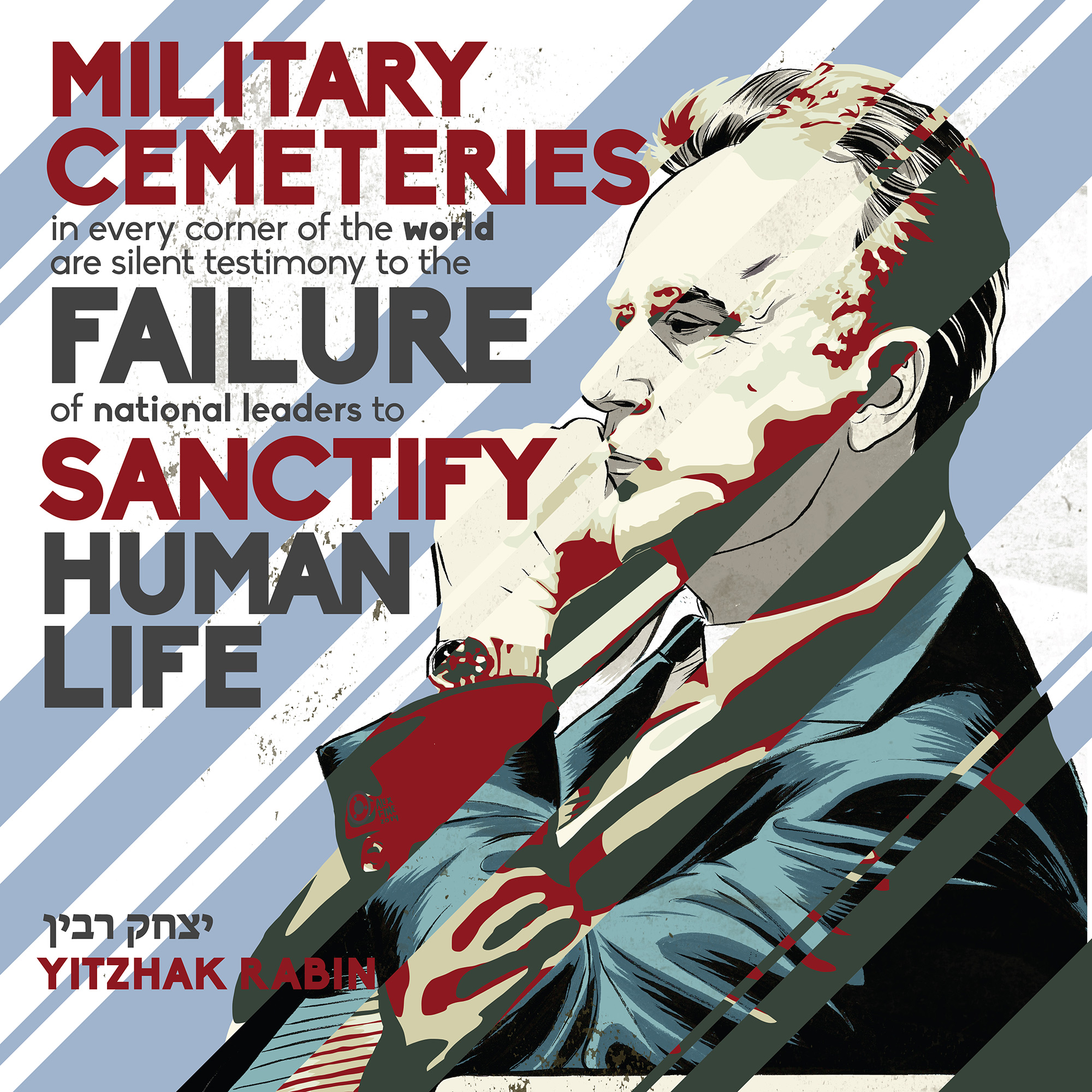
"""Military cemeteries in every corner of the world are silent testimony to the failure of national leaders to sanctify human life.""
1994 Nobel Peace Prize lecture (10 December 1994)
This piece was created as a collaboration between Benjamin Jancewicz and Alex Fine.
From /u/tayaravaknin:
Rabin, commander of the army or not, was never all that big on fighting. He was very prone to nervousness and never got nearly as much war credit as people like Sharon, though he still did get significant security boosts that made him so uniquely placed to sign Oslo. Prior to the '67 war, there are indications that in the lead up he suffered a nervous breakdown and was diagnosed with acute anxiety and put under sedation.
Rabin had always been more likely to make peace, being in the left wing as well. Rabin was the one to sign one of the Sinai agreements that acted as a precursor to the Camp David accords only three years later. When he reassumed office as prime minister (his first tenure was relatively short after Meir stepped down and Begin took over in '77), he was doing so against a backdrop of Likud control. Besides a brief hiatus of Labor control from '84-'86, Likud had maintained control from '77-'92, during which a lot had happened. But under Shamir, and after the dismal failure of the Madrid Conference with Likud at the helm and the brutal crackdown on the First Intifada (which was mostly nonviolent Palestinian-wise, though Palestinian violence did get more common in the later years), things weren't looking great. Israel was looking for $10 billion in loan guarantees from the US to get money to help Soviet refugees who we're fleeing to Israel.
However, Shamir would not agree to US conditions to get this to happen, so Bush the first ended up delaying the loan guarantees for quite some time (also meant to help Rabin win the election in 1992). Shamir never got the loan guarantees. Instead, Rabin immediately after taking office made a big push to get the effects of the First Intifada behind him and tried to get back in the US's good graces. Consequently, it was Rabin who managed to get the loan guarantees from the US.
To quickly address a common misconception, a loan guarantee is effectively (to simplify it) a guarantee that the US is backing Israel's loans up on the world markets to ensure that Israel could actually secure the loans (which isn't as necessary nowadays since Israel has a higher credit rating). The US doesn't pay a cent for those loan guarantees it gave, from my understanding, which makes it different from aid or grants, but Israel ends up footing the whole bill and paying the US for administration and other fees.
Rabin, as a former military man, was left-wing and thus more inclined towards peace that trusted a Palestinian renunciation of terrorism, while Netanyahu and the opposition strongly opposed any peace accord, arguing the Palestinians were not genuine partners for peace. The failure of Oslo was not only a goal of Netanyahu, but clearly served to separate left from right for some time (and some could argue is why the right is so much more powerful in the face of failed agreements and the Second Intifada).
Regardless, Rabin was not perfect in following through on Oslo either, and neither was Arafat. With the assassination of Rabin in '95, peace was further than ever, and Netanyahu took over, deliberately sabotaging Oslo and claiming this was due to Arafat not following through on his end. Whether that was justified is for others to decide on their own, but at any rate the death of Rabin was especially harmful to the process.
He had just been at a peace rally, a huge one, and sang songs of peace. He even had the lyrics to one given to him, and there's video of him putting it in his suit jacket pocket...some claim the bullet went through the song in symbolic fashion. Rabin's legacy and memory are akin, from my understanding, to JFK's in the United States. He is revered and remembered fondly, despite the failure of Oslo, because of how close he brought Israel to peace, and his death was a shock to the nation. The videos of people announcing it to crowds of reporters in the street are heart wrenching, as are the videos of people crying and lamenting in the streets that night (similar, again, to JFK)."
Hi! I am a robot. I just upvoted you! I found similar content that readers might be interested in:
https://www.reddit.com/r/Israel/comments/2gknpy/who_was_yitzhak_rabin/
Downvoting a post can decrease pending rewards and make it less visible. Common reasons:
Submit